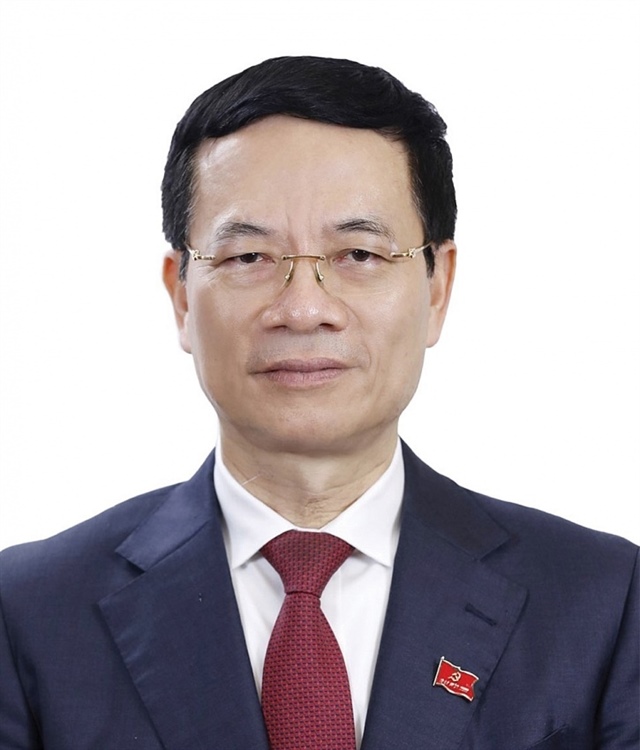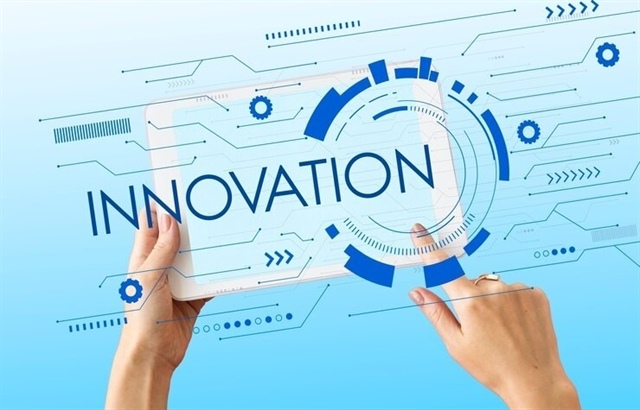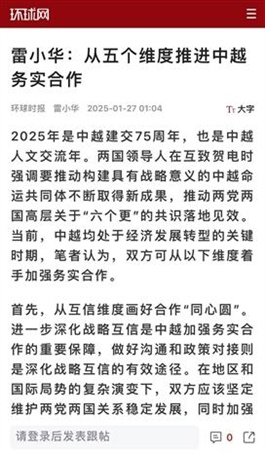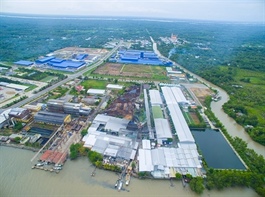Sci-tech and innovation can spearhead development
Sci-tech and innovation can spearhead development
This year, Vietnam continues on its path to become a developed country with high income, prosperity, and wealth.
Five years ago, the application of IT was popular, while digital transformation was very new. The government’s National Digital Transformation Programme issued in 2020 was a pioneering decision. The past five years have been a journey of both working and exploring.

Nguyen Manh Hung, minister of Information and Communications |
It is this spirit of daring to explore new things that has put Vietnam in the group of countries with the fastest growth rate in digital economy, e-commerce, e-government, online public services, and digital transformation.
Vietnam aims to become an upper middle-income country by 2030, when the country’s per capita income ranking will be in the top 100 globally. Digital infrastructure, technology, and industry must be accelerated, and international rankings in 2030 must be in the top 50 globally, twice as high as the economic ranking. This is the goal set out in Resolution No.57-NQ/TW on science, technology, innovation, and digital transformation.
Regarding postal services, Vietnam is ranked 31st internationally, and we aim to enter the top 20. For telecommunications, we are ranked 72nd and the progress has been quick. In 2018, Vietnam was ranked 108th. By 2030, Vietnam’s telecommunications will be in the top 50 globally, and if we are more proactive, the top 40.
In terms of data infrastructure, Vietnam has reached 2MW per one million people, although there is no foreign investment in data centres. The country is currently in the top 60 globally. If it can pull in big tech giants to invest in data centres and Vietnamese enterprises continue to invest heavily in data centres, by 2030, Vietnam can be in the top 30 globally.
For cybersecurity, Vietnam is ranked high, at 17th globally, but our goal is to be in the top 10.
Vietnam is ranked high for digital technology exports worldwide: second in smartphones; fifth in computer components; sixth in computer equipment; eighth in electronic equipment and components; and seventh in software outsourcing.
We will continue to maintain our high ranking, strive to enter the global top 15, and increase the ratio of Vietnam’s value from 32 to 50 per cent by 2030.
In 2024, Vietnam ranked 71st in e-government, up 15 places after two years. We are also experiencing rapid changes in rankings. If we achieve the goal of 80 per cent of public services for individuals and businesses being fully online in 2025, Vietnam will not need to wait until 2030, but 2028, to enter the global top 50.
We often compare ourselves with ourselves, but we need to compare ourselves with other countries around us, even developed ones, to change the national ranking. We have the strength to rise, and our per capita income has reached the average level.
The Ministry of Information and Communications (MIC) and the Ministry of Science and Technology (MoST) is in the process of a merger. The two merged ministries must find common synergies to become stronger. The MoST manages technology development in general, while the MIC manages IT and digital technology as core technologies, and the foundation for all other sectors and industries.
Over 50,000 digital technology enterprises under the management of the MIC will now have faster access to research results of the MoST, making science and technology closer to enterprises, faster turning research results into useful products.
The two ministries will become one new, essential, and large ministry. Party General Secretary To Lam signed and issued Resolution 57 in December, which contains many revolutionary viewpoints, tasks, and solutions, similar to one for agriculture 40 years ago. We will move towards sufficient export of science, technology, innovation, and digital transformation, just like we did with agriculture. Four decades ago it was to escape poverty, and now it is to escape the middle-income trap.
The common spirit of both resolutions is to manage objectives, giving autonomy and responsibility to people to benefit from the fruits of their labour and creativity. The newly merged ministry will be the core force to realise this particularly important resolution.
Resolution 57 identifies sci-tech, innovation, and digital transformation as the main pillars for national development in the new era. In which, sci-tech is the foundation, creating knowledge and tools. Innovation is the driving force to ensure new knowledge and new tools into ideas and solutions. Digital transformation is the realisation of knowledge, tools, ideas, and solutions into products and service to create real value.
It also emphasises mastering sci-tech in the digital transition process in Vietnam. Assigning core enterprises to undertake major projects and to master strategic technologies is key. This is a two-pronged approach: mastering the process and forming large technology enterprises nationwide
From now on, digital transformation has become the cause of the Party and the people. It will enter a development phase, and we expect the transformation to make a particularly important contribution to Vietnam’s rise to become a developed socialist country with high income by 2045, when Vietnam will celebrate 100 years of existence.
|
Pavel Poskakukhin and Bruno Sivanandan Co-chairs, Digital Sector Committee European Chamber of Commerce in Vietnam Vietnam’s digital landscape is poised for significant growth in 2025 and beyond, underpinned by a young, tech-savvy population and government initiatives supporting the transformation.
This will take place across industries. E-commerce sector continues to expand rapidly, driven by increasing urbanisation, smartphone adoption, and the rise of cashless payments. Businesses are investing in advanced logistics, AI-powered personalisation, and seamless integration between online and offline channels to enhance customer experiences. The fintech industry is also flourishing, with innovations in mobile payments, digital banking, and peer-to-peer lending attracting substantial investment. Regulatory support for open banking frameworks and digital currencies is expected to drive further development in this space. Enterprise digitalisation is accelerating as businesses seek to enhance efficiency and competitiveness. Investments in cloud computing, extended producer responsibility systems, and cybersecurity are becoming critical. In parallel, AI and automation are gaining traction in sectors such as health, manufacturing, and retail. Edtech is another key area of growth, driven by the need to upskill Vietnam’s workforce. Emerging platforms are adopting AI and hybrid learning models to offer effective solutions for lifelong learning and vocational training. These developments underscore the vibrant and rapidly evolving nature of Vietnam’s digital ecosystem. Businesses and investors who strategically align with these trends will be well-positioned to capitalise on the immense opportunities in this dynamic market. In 2024, we have successfully engaged various public and private stakeholders to promote best business practices with respect to data protection regulation, cybersecurity laws, and various digital transformation initiatives. We also saw progress in digital transformation. This has been underpinned by a series of new laws, decrees, and circulars that establish a robust framework for businesses in Vietnam’s digital landscape, particularly those managing various forms of data. These regulations aim to level the playing field for local and foreign companies, fostering fair competition and benefiting Vietnamese consumers. This year also marks the first year of implementing Resolution No.57-NQ/TW on groundbreaking advancements in science, technology, innovation, and national digital transformation. Within this context, the Digital Sector Committee (DSC) identifies several critical areas for further development and collaboration. Firstly, Prime Minister Pham Minh Chinh last year launched Vietnam’s semiconductor industry development strategy. This strategy represents a significant milestone in Vietnam’s ambition to become a global hub for semiconductors, a cornerstone of the modern economy. In 2025, the strategy enters its first phase, focusing on selective foreign direct investment attraction and establishing Vietnam as a global hub for semiconductor talent. Secondly, the draft Digital Technology Industry Law recognises semiconductors as a strategic technology, setting the goal of gradually mastering it by 2030. It also prioritises managing and developing emerging fields, such as digital assets and AI. Additionally, the draft Personal Data Protection Law is essential to safeguarding personal data rights, preventing infringements, and enhancing accountability across entities handling such data. These upcoming frameworks are critical for strengthening Vietnam’s digital ecosystem and solidifying its position as a regional leader in digital transformation. Building on the momentum of these upcoming initiatives, we do believe that a clear and stable regulatory environment, effective implementation of policies, and alignment with international standards are essential to ensure Vietnam’s digital ecosystem continues to thrive. The DSC also advocates for aligning Vietnamese laws with EU standards, which would reduce compliance burdens, facilitate legal navigation, and encourage further investment from European businesses. By harmonising regulations, Vietnam can create a more competitive and innovative digital sector, bolstering investor confidence and driving long-term capital, expertise, and innovation into its economy. |

























